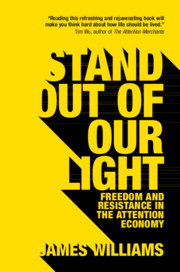In order to do anything that matters, we must first be able to give attention to the things that matter. Doing so has never been easy, but lately it’s become harder in new and surprising ways.
While we weren’t watching, a next generation threat to human freedom materialized right in front of our noses. We didn’t notice it because it came in forms that were already familiar to us. It came bearing gifts of information, historically a scarce and valuable resource, but delivered them in such abundance, and with such velocity, that these gifts became a mountain of burdens. Most disarming of all, it came to us with the promise that it was on our side: that it was designed to help us navigate our lives in the ways we want them to go.
Yet these little wondrous machines, for all their potential, have not been entirely on our side. Rather than supporting our intentions, they have largely sought to grab and keep our attention. In their cutthroat competition against one another for the increasingly scarce prize of “persuading” us – of shaping our thoughts and actions in accordance with their predefined goals – they have been forced to resort to the cheapest, pettiest tricks in the book, appealing to the lowest parts of us, to the lesser selves that our higher natures perennially struggle to overcome. Furthermore, they now deploy in the service of this attentional capture and exploitation the most intelligent systems of computation the world has ever seen.
For too long, we’ve minimized the threats of this intelligent, adversarial persuasion as mere “distraction,” or minor annoyance. In the short term, these challenges can indeed frustrate our ability to do the things we want to do. In the longer term, however, they can make it harder for us to live the lives we want to live, or, even worse, undermine fundamental capacities such as reflection and self-regulation, making it harder, in the words of philosopher Harry Frankfurt, to “want what we want to want.” Seen in this light, these new attentional adversaries threaten not only the success but even the integrity of the human will, at both individual and collective levels.
Some threats to freedom we recognize immediately; others take time to reveal themselves for what they are. In the case of this intelligent, adversarial persuasion that increasingly pervades human life, the process of recognition is only beginning. The threats, by contrast – the infrastructures and incentives that underlie their operation – are now quite mature and deeply entrenched. As a result, it may be too late to bring these adversarial systems onto our side. They may now be too embedded in our lives to extricate. I do not believe this to be the case myself – the situation is not entirely hopeless – but the gate to salvation is narrow, and closing quickly.
I used to think there were no great political struggles left. The truly epic defenses of freedom, I thought, had already been fought and won by generations greater than my own, leaving to my time only the task of dutifully administering our hard-earned political inheritance.
How wrong I was. The liberation of human attention may be the defining moral and political struggle of our time. Its success is prerequisite for the success of virtually all other struggles. We therefore have an obligation to rewire this system of intelligent, adversarial persuasion before it rewires us. Doing so requires hacking together new ways of talking and thinking about the problem, as well as summoning the courage necessary for advancing on it in inconvenient and unpopular ways.
In the short space of this book, my aim is to calibrate the compass for this effort rather than draw up any detailed maps. I’ll have more questions than answers; this will be more exploration than argument. Read this as an unfolding of intuitions, a quest for the right words. Ralph Waldo Emerson wrote, “sometimes a scream is better than a thesis.” This will be a bit of both.
The brief, yet full, time during which I have written this book would not have been possible without the extraordinary generosity and foresight of the Kadas Prize Foundation, Cambridge University Press, the Centre for Research in the Arts, Social Sciences and Humanities (CRASSH) at the University of Cambridge, and the superhuman efforts of the Nine Dots Prize staff and board. This privilege is only compounded by the fact that it serves to inaugurate what will no doubt be a series of similar efforts to come. My hope is that the present effort proves worthy of the generosity of their, and your, attention.

